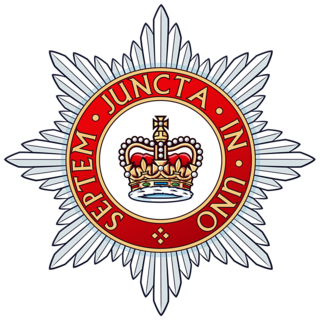
Charles Hardinge, 1st Baron Hardinge of Penshurst, was a British diplomat and statesman who served as Viceroy and Governor-General of India from 1910 to 1916.

The Keeper of the Privy Purse and Treasurer to the King/Queen is responsible for the financial management of the Royal Household of the Sovereign of the United Kingdom.
The Master of the Household is the operational head of the "below stairs" elements of the Royal Households of the United Kingdom. The role has charge of the domestic staff, from the Royal Kitchens, the pages and footmen, to the housekeeper and their staff.

Her Majesty's Marshal of the Diplomatic Corps is a senior member of the Royal Household of the Sovereign of the United Kingdom. He is the Queen's link with the diplomatic community in London, arranges the annual diplomatic corps reception by the Sovereign, organises the regular presentation of credentials ceremonies for ambassadors and high commissioners, and supervises attendance of diplomats at state events. Marshals generally hold office for ten-year terms and are normally retired senior military officers, though the last three marshals have been diplomats. The marshal is assisted by the Vice-Marshal of the Diplomatic Corps, the First Assistant Marshal, and other assistant marshals.

The Major-General commanding the Household Division commands the Household Division of the British Army and is also the General Officer Commanding London District. The Major-General has sole responsibility for the Service aspect of all State and ceremonial occasions within London District, having executive command of the Household Division and of any other units brought into London for ceremonial purposes and is the main channel of communication between the Household Division and the Monarch. He or she is appointed by The Queen, and will previously have commanded a Regiment or Battalion within the Household Division.

Lieutenant Colonel Sir Derek William George Keppel was a member of the British Royal Household.
Colonel Sir Arthur Davidson, was a British soldier and courtier.
The Coronation Honours 1911 for the British Empire were announced on 19 June 1911, to celebrate the coronation of George V which was held on 22 June 1911.
The Royal Households of the United Kingdom consists of royal officials and the supporting staff of the British Royal Family, as well as the Royal Household which supports the Sovereign. Each member of the Royal Family who undertakes public duties has his own separate Household.
The 1902 Birthday Honours were announced on 10 November 1902, to celebrate the birthday of Edward VII the previous day. The list included appointments to various orders and honours of the United Kingdom and the British Empire.
The 1913 Birthday Honours were appointments in the British Empire of King George V to various orders and honours to reward and highlight good works by citizens. The appointments were made to celebrate the official birthday of The King, and were published on 3 June 1913 and 6 June 1913.
The 1902 Coronation Honours were announced on 26 June 1902, the date originally set for the coronation of King Edward VII. The coronation was postponed because the King had been taken ill two days before, but he ordered that the honours list should be published on that day anyway.
The New Year Honours 1921 were appointments by King George V to various orders and honours to reward and highlight good works by members of the British Empire. They were published on 31 December 1920.
The New Year Honours 1926 were appointments by King George V to various orders and honours to reward and highlight good works by members of the British Empire. They were published on 29 December 1925.

Major-General Sir Henry Peter Ewart, 1st Baronet, was a British Army officer and courtier.
The 1920 Birthday Honours were appointments by King George V to various orders and honours to reward and highlight good works by citizens of the British Empire. The appointments were made to celebrate the official birthday of The King, and were published in The London Gazette on 4 June 1920.
The 1921 Birthday Honours were appointments by King George V to various orders and honours to reward and highlight good works by citizens of the British Empire. The appointments were made to celebrate the official birthday of the King, and were published on 3 and 4 June 1921.
The Royal Households of the United Kingdom consists of royal officials and the supporting staff of the British Royal Family, as well as the Royal Household which supports the Sovereign. Each member of the Royal Family who undertakes public duties has their own separate household. When Elizabeth II succeeded her father George VI as sovereign of the United Kingdom, she appointed a new household.





